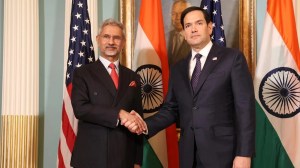Dr Singh, water plus light
Dear Prime Minister: I have lived and worked with poor rural families earning less than Rs 40 a day for the last 34 years. In Tilonia, Rajas...

Dear Prime Minister: I have lived and worked with poor rural families earning less than Rs 40 a day for the last 34 years. In Tilonia, Rajasthan, we began the first Barefoot College only for the rural poor, where we try to keep the ideas of Mahatma Gandhi alive. From this village, I have seen so many governments come in with a bang. They make rash promises and pretend to know the rural realities just because they have won an election. And they leave with a whimper. How is it that these so-called intelligent people do not know what the rural poor really wanted from governments? It seems so obvious. Food, water, light, housing: basic minimum needs.
We have a vast government machinery that can be focused to providing these. We do not need any new committees and steering groups, only to prepare yet more plans. Remember what the late Raj Krishna said when he was shown the Approach Paper of the Seventh Plan in the 8217;80s: 8220;It8217;s the Seventh Approach to the same Plan.8221; These Plans are full of jargon, so utterly boring, so out of touch with reality. When the rural poor are dying of hunger, when all we can offer them are promises on pieces of paper, then we have a serious problem.
This is where your government8217;s credibility is put to the test. No more statistics and committees deciding on poverty lines, please. No more speeches in mystified language. We have so many generals in the development world 8212; full of bluster, rife with strategies 8212; and such few jawans. The Do-ers 8212; and the ordinary, gutsy people who are ready to fight discrimination, injustice, corruption, communalism on the frontline. These are the people you should support. They have engineered the million mutinies occurring every day in India8217;s 600,000 villages, over the non-issue of rations card or the non-availability of drinking water or corruption in development projects.
There are so many struggling with the rural poor who are prepared to work with you. Why? Because you are a reluctant politician who has found himself in a unique position to make a difference on the ground. You have their support. These very people have tested and proven low-cost community based ideas and methods that have made an impact. They have made mistakes, but they have also made progress. Now you need to bring these innovators and warriors together and scale their efforts up to cover more villages.
When we were a part of Sam Pitroda8217;s Technology Missions in the 8217;80s, we fought tooth and nail against government water engineers forcing expensive technology solutions on villages. Drinking water cannot be regarded as a technical problem: it is always a social and ethical problem of distribution, wastage, lack of involvement and ownership by local communities. Government engineers wanted communities to be dependent on them. They do not think over-exploitation of groundwater is a crime. Today, in spite of crores being spent, thousands of village schools and dispensaries have no drinking water. Traditional open wells have dried up because deep tube wells have sucked the water out of the ground to feed cities at the cost of villages. The only solution they could come up with was to instal more hand pumps, going deeper for groundwater, installing more and more piped water supply schemes. We calculated that with the cost of one drilling rig it was possible to collect 12 million litres of rainwater in 200 schools and give employment to over 1,000 people in the rural areas for four months just before the rains.
The choice was clear but do engineers listen? Your government must initiate a massive rooftop rainwater harvesting campaign in rural schools and dispensaries and make sure every school has a 50-100,000 litre rainwater harvesting tank along with toilets for girls. If the government is interested in more children attending school, if it wants to revitalise panchayati raj institutions, if it wishes to respect village skills and leave it to the communities to construct these tanks themselves, then this is the only way.
If the drinking water scenario is a disaster because of the neglect, ignorance and short-sighted policies of engineers, then the way the state electricity boards are providing power to villages is a monumental catastrophe. For the last 10 years, Parliament has been fed with fudged data on electrified villages. Only the engineers have benefitted. It has come to such a stage that the certificates of sarpanches are overruled by engineers. What8217;s so technical about declaring a village with no electricity amazes me.
After putting some pressure on my friend Montek Ahluwalia then a member, now deputy chairman of the Planning Commission, a Planning Commission Group was set up to study the extensive use of non-conventional decentralised energy systems, like wind and bio-mass, on a massive scale to cover the remaining non-electrified villages. This forced the power ministry to change its definition of a non-electrified village. By the new definition, over 100,000 8220;electrified8221; villages were added to the infamous non-existent list of villages that still remain in total darkness.
A 8220;barefoot8221; approach to solar electrification of villages without power, by training illiterate, unemployed rural residents, can create over 100,000 jobs in one year. Selected by the panchayats, answerable to the panchayats, over 200 remote mountain villages Ladakh, Sikkim, tribal areas MP, Assam, Bihar have been electrified, thus making them technically and financially self sufficient. By decentralising it to the household level, they have for over five years maintained these solar units to provide lighting for three hours. But do you think the bureaucrats in the ministry of non-conventional energy sources are enthusiastic about this approach? They do not even want to acknowledge the word 8220;barefoot8221;! Two new and simple ideas of providing drinking water and lighting that are tested on the ground: roof top rainwater harvesting and solar electrification. Both use local skills and are community managed and owned; generated jobs and improved the quality of life.
This is what the rural poor want from this government for a start. Drinking water and lighting. So simple. The funds required is a pittance compared to the colossal amount wasted so far. Don8217;t leave it to engineers and experts. Take it out of their hands. Leave it to the poor communities who could have the capacity and competence to do it themselves. Remember Julius Nyerere8217;s observation: 8220;People cannot be developed. They develop themselves.8221;
- 01
- 02
- 03
- 04
- 05































